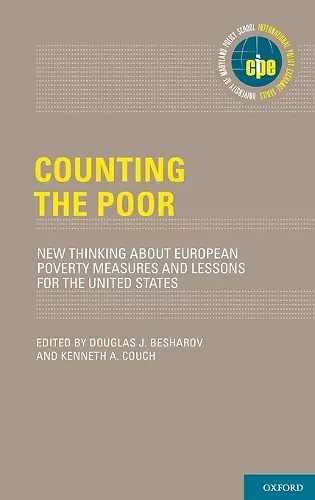Counting the Poor
New Thinking About European Poverty Measures and Lessons for the United States
Douglas J Besharov editor Kenneth A Couch editor
Format:Hardback
Publisher:Oxford University Press Inc
Published:5th Jul '12
Currently unavailable, and unfortunately no date known when it will be back

The poverty rate is one of the most visible ways in which nations measure the economic well-being of their low-income citizens. To gauge whether a person is poor, European states often focus on a person's relative position in the income distribution to measure poverty while the United States looks at a fixed-income threshold that represents a lower relative standing in the overall distribution to gauge. In Europe, low income is perceived as only one aspect of being socially excluded, so that examining other relative dimensions of family and individual welfare is important. This broad emphasis on relative measures of well-being that extend into non-pecuniary aspects of people's lives does not always imply that more people would ultimately be counted as poor. This is particularly true if one must be considered poor in multiple dimensions to be considered poor, in sharp contrast to the American emphasis on income as the sole dimension. With contributions from the world's foremost authorities on income and social measurement, the book provides detailed discussions of specific issues from a European perspective followed by commentary from American observers. The volume considers (1) current standards of poverty measurement in the European Union and the Organization for Economic Co-operation and Development, (2) challenges in extending those measures to account for the value of the provision of in-kind and cash benefits from the government, (3) the interaction of poverty measures with social assistance, (4) non-income but monetary measures of poverty, and (5) multi-dimensional measures of poverty. The result is a definitive reference for poverty researchers and policymakers seeking to disengage politics from measurement.
"Volumes like this highlight the important role that cross-national or comparative research can play in illuminating common problems around the globe. In this case, important European research on income and poverty issues help inform the U.S. debate and serve as models for future research and analysis in all countries."-Sandra O. Archibald, Dean and Professor, Evans School of Public Affairs, University of Washington "Calculating poverty rates is both technically challenging and politically explosive. With the poverty rate serving as a proxy for inequality and even social justice, counting the poor is a controversial task. But by drawing on how European countries and the United States tackle the challenge, and reviewing the range of methodologies, this excellent volume of papers provides invaluable lessons and insights that could help us at last to agree on how to think about the measurement of poverty."-Stuart M. Butler, Director, Center for Policy Innovation, The Heritage Foundation "Perhaps surprisingly, considering the firm commitment of so many modern governments to social policy and poverty reduction, poverty measurement itself remains very much a work in progress-replete with many deep, nettlesome and unsettled technical issues. This welcome collection brings together some of the latest thinking on the topic by a number of the best researchers in the field on both sides of the Atlantic and, in fact, around the world. Counting the Poor will be required reading for anyone who wants to be up to date on this subject."-Nicholas Eberstadt, Henry Wendt Chair in Political Economy, American Enterprise Institute "Seen as a collection of interrelated themes, I find this book a worthy read for several reasons. First, within each theme, the chapters and the overall conclusion provide a nice overview of current academic and policy thinking in general and for Europe in particular. Second, the concluding chapter of the theme continues adding insights because it critically reviews the arguments seen through a US lens. Thirdly and more subtly, the book reveals differences in American and European perspectives on issues such as solidarity (federal vs. national), distributing benefits from economic growth (less vs. more equal), the use of official poverty lines..., and the definition of poverty (low income vs. social exclusion). As politics and policy are never far removed from poverty measurement, it is this characteristic of the book that makes it a relevant read, not only for a US audience but also for a European audience." -- International Journal of Social Welfare
ISBN: 9780199860586
Dimensions: 160mm x 234mm x 43mm
Weight: 816g
448 pages